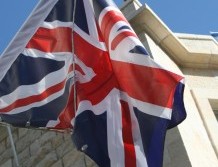
Will UK officially join bombing campaign on ISIS in Syria? British Flag. Illustrative. By Joshua Spurlock
Terrorism from ISIS has crossed many borders, and in response British Prime Minister David Cameron wants the Royal Air Force to cross one more to hunt the group down—in Syria. So far, the British have officially limited their air strikes against ISIS (also known as ISIL or Islamic State) to Iraq, a friendlier nation to the UK than Syria, which is led by brutal dictator Bashar al-Assad. But that’s going to change, if Cameron gets his way.
“Success in Iraq in squeezing the so-called caliphate [ISIS’ Islamic empire] is put at risk by our failure to act in Syria,” said Cameron to the British Parliament on Thursday. “This border is not recognized by ISIL and we seriously hamper our efforts if we stop acting when we reach the Syrian border.”
Cameron’s statement, posted to the UK Prime Minister’s Office website, counters the argument that additional strikes on ISIS could make Britain a greater target for the terror group because “the UK is already in the top tier of countries that ISIL is targeting.”
Cameron said that ISIS has “repeatedly tried to attack us” in the UK, with seven foiled terror plots in the last 12 months alone. Cameron said every attack plan was “either linked to ISIL or inspired by their propaganda.”
The Guardian newspaper reported that due to the divided British parliament, the Labour party’s position on the Syrian air strikes will be critical. The Guardian also reported that Labour is expected to make a decision next week.
Following the attacks on Paris, ISIS has become a global target. French President François Hollande is visiting Russia to meet with President Vladimir Putin. The Russian President’s website said ahead of the meeting that the two leaders, “will discuss the effort to combat terrorism, including coordination in the fight against the Islamic State group.”
The Russians and the Americans are already battling ISIS in Syria and the French pushing for support in the fight against the terror group, Cameron believes the time is now to expand the British involvement.
Said Cameron, “If we won’t act now when our friend and ally France has been struck in this way, then our allies in the world can be forgiven for asking if not now, when?”
(By Joshua Spurlock, www.themideastupdate.com, November 26, 2015)
